
AGROCIENCIA
Scope & Guideline
Driving progress in agronomy and environmental science.
Introduction
Aims and Scopes
- Sustainable Agricultural Practices:
Research focused on methods that promote sustainability in agriculture, including organic farming, agroecology, and conservation agriculture. - Crop Improvement and Genetics:
Studies aimed at enhancing crop varieties through genetic modification, breeding techniques, and phenotypic evaluations to increase yield and resistance to pests and diseases. - Agroecosystem Management:
Research on the management of agricultural ecosystems, including soil health, water management, and the integration of livestock and crop systems. - Food Security and Nutrition:
Papers addressing the challenges of food security, nutritional quality of crops, and the development of food systems that ensure access to healthy foods. - Environmental Impact Studies:
Research assessing the environmental impacts of agricultural practices, including studies on biodiversity, soil health, and the effects of agrochemicals. - Socio-economic Aspects of Agriculture:
Investigations into the economic viability of agricultural practices, farmer behavior, market dynamics, and the role of agricultural cooperatives. - Technological Innovations in Agriculture:
Research on the application of technology in agriculture, including precision farming, remote sensing, and the use of artificial intelligence for crop management.
Trending and Emerging
- Climate Change Adaptation Strategies:
An increasing number of studies are addressing the impacts of climate change on agriculture, focusing on adaptation strategies that enhance resilience in crop and livestock systems. - Agroecology and Biodiversity:
Research highlighting the importance of biodiversity within agricultural systems and the application of agroecological principles is on the rise, promoting sustainable farming practices. - Nutraceuticals and Functional Foods:
There is a growing trend in exploring the health benefits of agricultural products, including the development of functional foods with enhanced nutritional profiles. - Digital Agriculture and Precision Farming:
The integration of digital technologies and precision agriculture techniques is increasingly being explored, focusing on data-driven approaches to optimize crop production. - Waste Management and Bioconversion:
Research on the utilization of agricultural waste for bioconversion into biofuels and other valuable products is gaining momentum, reflecting sustainability goals. - Soil Health and Microbial Communities:
Studies investigating soil health, microbiome interactions, and their role in plant growth and resilience are increasingly featured, emphasizing the importance of healthy soils.
Declining or Waning
- Traditional Pest Control Methods:
There has been a noticeable decrease in research focused on traditional pest control methods, as newer integrated pest management strategies and organic alternatives gain traction. - Single Crop Systems:
Research on monoculture practices is declining as interest shifts towards more sustainable and diverse cropping systems that enhance resilience and productivity. - Chemical Fertilization Techniques:
Studies specifically centered on chemical fertilization are less frequent, reflecting a growing emphasis on organic and sustainable soil fertility practices. - Conventional Breeding Techniques:
There is a waning focus on conventional breeding methods, as genetic engineering and biotechnological approaches become more prominent in crop improvement research. - Livestock Production in Isolation:
Research focusing solely on livestock production without integrating crop systems or agroecological approaches is becoming less common.
Similar Journals
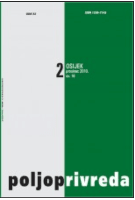
Poljoprivreda
Nurturing collaboration for global agricultural progress.Poljoprivreda is a distinguished open-access journal dedicated to the field of agronomy and crop science, published by the FAC Agriculture Osijek in Croatia. Since its inception in 2000, the journal has been committed to disseminating high-quality research that informs both academic and practical advancements in agriculture. With an ISSN of 1330-7142 and an E-ISSN of 1848-8080, Poljoprivreda provides a vital platform for researchers, professionals, and students to engage with the latest findings and methodologies in agronomy, contributing significantly to the enhancement of agricultural practices in Croatia and beyond. Although currently ranked in the 22nd percentile within its category according to Scopus, the journal aspires to elevate its standing by welcoming innovative research that addresses contemporary challenges within the agricultural sciences. By fostering open access since 2000, Poljoprivreda ensures that its scholarly content is freely available, promoting wider dissemination and collaborative opportunities among researchers globally.

AGROCHIMICA
Fostering innovation in agronomy and food systems.AGROCHIMICA is an eminent journal published by PISA UNIV PRESS, dedicated to advancing the fields of Agronomy, Crop Science, Food Science, and Soil Science. With a rich history dating back to its inception in 1973, this journal has evolved through various phases of publication, illustrating its commitment to delivering quality research over several decades. Although currently categorized in the Q4 quartile across its respective disciplines, AGROCHIMICA provides a platform for foundational and innovative studies that contribute to knowledge in agricultural practices and sustainable food systems. While the journal is not open access, it remains a valuable resource for researchers, professionals, and students interested in Italy's and the global agricultural landscape, fostering a greater understanding of the complexities within these interconnected fields. The ISSN associated with this journal is 0002-1857, and it is published from Pisa, Italy, addressing the evolving challenges in agriculture with a spotlight on rigorous scientific inquiry.
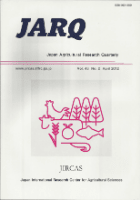
JARQ-JAPAN AGRICULTURAL RESEARCH QUARTERLY
Bridging Science and Sustainability in AgricultureJARQ - Japan Agricultural Research Quarterly serves as a pivotal platform in the field of agricultural sciences, published by the esteemed Japan International Research Center for Agricultural Sciences. Established in 1973, this journal has a rich history and plays a critical role in disseminating significant research findings relevant to agronomy, crop science, animal science, ecology, and biotechnology. Despite its ranking in the lower quartiles, with impressive coverage from 1973 to 2024, it continues to attract contributions that enhance agricultural strategies and practices in Japan and beyond. The journal facilitates discussions that are essential for fostering innovation in agricultural methodologies and environmental sustainability. Accessible to a diverse audience, including researchers, academics, and practitioners, JARQ emphasizes the importance of advancing agricultural research and its implications for food security and ecological balance.

NJAS-Impact in Agricultural and Life Sciences
Empowering the dialogue on life sciences and agricultural advancements.NJAS-Impact in Agricultural and Life Sciences is a pivotal open-access journal, published by Taylor & Francis Ltd, focusing on the interdisciplinary nexus between agricultural practices and life sciences. Anchored in the United Kingdom, this journal aims to provide a comprehensive platform for the dissemination of innovative research that addresses critical challenges in environmental sustainability, agricultural productivity, and biological advancements. With its inaugural issue dated from 2023 to 2024, NJAS prominently features the latest empirical studies, reviews, and theoretical contributions that enrich existing knowledge and provoke thought among researchers and practitioners alike. Although currently ranking within the lower percentiles across various Scopus categories, the journal aspires to establish itself as a significant contributor to the dialogue on agricultural and environmental sciences. As scholars in these fields seek to bridge the gaps in understanding, NJAS invites submission from diverse perspectives, underscoring the importance of collaborative knowledge-building in addressing the complexities of our changing global landscape.

Agriculture-Basel
Fostering Knowledge in Agriculture and Food TechnologiesAgriculture-Basel is a prestigious, peer-reviewed journal published by MDPI, specializing in the dynamic fields of agronomy, crop science, food science, and plant science. Established in 2011, this open-access journal serves as a pivotal platform for disseminating innovative research and developments in agricultural practices and technologies. With its impressive impact factor and ranking within the top quartiles in key categories, including Q1 in Agronomy and Crop Science and Q2 in Food Science and Plant Science, the journal has garnered significant attention from the research community. Its current Scopus rankings reflect its influence and importance, with notable positions in agricultural and biological sciences. Aimed at researchers, professionals, and students in the agricultural sector, Agriculture-Basel is committed to fostering a deeper understanding of sustainable practices and advancements in the field. With an emphasis on accessibility, the journal ensures that its valuable content is freely available since its inception, making it a cornerstone resource for all those engaged in contemporary agricultural research and applications.
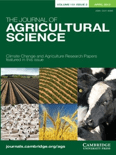
JOURNAL OF AGRICULTURAL SCIENCE
Elevating Agricultural Science to New HeightsJOURNAL OF AGRICULTURAL SCIENCE, published by Cambridge University Press, stands as a pivotal resource in the field of agricultural research. With a rich history dating back to 1905, this esteemed journal has consistently delivered cutting-edge scholarly articles that address pressing issues in agronomy, crop science, animal science, and genetics. Currently holding a Q2 ranking in Agronomy and Crop Science and Animal Science and Zoology, and a Q3 in Genetics, it reflects a robust impact within the academic community, contributing to innovative practices and technologies in agriculture. Indexed in Scopus, its authors benefit from broad visibility, supported by a strong readership among researchers, professionals, and students alike. While the journal does not currently offer open access, its rigorous peer-review process ensures that published works meet the highest scholarly standards, fostering a rich environment for knowledge exchange and advancement in agricultural science.

Journal of Agricultural Sciences-Tarim Bilimleri Dergisi
Empowering Research in Plant and Animal SciencesJournal of Agricultural Sciences - Tarim Bilimleri Dergisi, published by Ankara University, Faculty of Agriculture, is a prominent open-access journal that has been fostering academic dialogue in the field of agricultural studies since 2010. With ISSN 1300-7580 and E-ISSN 2148-9297, this journal contributes significantly to the scientific community, particularly within the realms of agronomy, crop science, animal science, and plant science. As of 2023, it holds a Q3 classification in Agronomy and Crop Science, and Q4 in both Animal Science and Zoology and Plant Science, indicating its growing influence and dedication to advancing research in these areas. Situated in Turkey, this journal serves as a vital platform for scholars, professionals, and students, inviting submissions that enhance our understanding of agricultural innovation and sustainability. With a commitment to disseminating high-quality research, Journal of Agricultural Sciences ranks favorably within Scopus, providing an invaluable resource for exploring evolving agricultural paradigms.
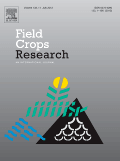
FIELD CROPS RESEARCH
Empowering Farmers with Evidence-Based ResearchFIELD CROPS RESEARCH is a premier academic journal published by Elsevier, dedicated to advancing knowledge in the fields of Agronomy and Crop Science as well as Soil Science. Now in its 46th year of publication, this esteemed journal has established itself as a leading resource, holding a prestigious Q1 ranking in both the Agronomy and Soil Science categories, with a remarkable blend of rigorous peer-reviewed research and innovative findings. With a Scopus ranking of #27/406 in Agronomy and #20/159 in Soil Science, and a notable 93rd and 87th percentile respectively, FIELD CROPS RESEARCH plays a vital role in informing practices that drive sustainable agriculture and optimize crop production. Although not an open access journal, it remains highly accessible to the global research community and offers critical insights that influence policy and agricultural practices worldwide. Researchers, professionals, and students are encouraged to delve into this journal, as it continues to shape the future of field crop research through impactful studies and comprehensive reviews.

SPANISH JOURNAL OF AGRICULTURAL RESEARCH
Cultivating Knowledge for Sustainable AgricultureThe Spanish Journal of Agricultural Research (ISSN: 1695-971X, E-ISSN: 2171-9292), published by the prestigious Consejo Superior Investigaciones Cientificas (CSIC), serves as a vital resource for those engaged in the fields of agronomy and crop science. Established as an Open Access journal since 2003, it aims to foster the dissemination of innovative research and practical applications related to agricultural practices and sustainability. With its Q3 category in Agronomy and Crop Science and a Scopus ranking of #224 out of 406, the journal provides an accessible platform for scholars to share valuable findings that enhance agricultural productivity and environmental stewardship. Covering research from 2006 to 2024, this journal continues to be instrumental for researchers, professionals, and students eager to remain at the forefront of agricultural science advancements.
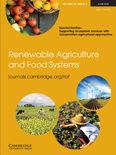
RENEWABLE AGRICULTURE AND FOOD SYSTEMS
Transforming food systems for a sustainable future.RENEWABLE AGRICULTURE AND FOOD SYSTEMS, published by Cambridge University Press, is a leading open-access journal dedicated to the advancement of sustainability in agricultural practices and food systems. With an ISSN of 1742-1705 and an E-ISSN of 1742-1713, this journal spans the interdisciplinary fields of agronomy and food science, achieving a commendable Q2 ranking in both categories for 2023. As it continues to converge through the years from 2004 to 2024, the journal offers a platform for researchers, professionals, and students to disseminate transformative research that addresses the challenges of food security, resource management, and environmental impact. The journal’s significant impact is underscored by its Scopus rankings, situating it in the 77th percentile among agronomy and crop science publications, and the 67th percentile in food science. Since becoming fully open access in 2023, RENEWABLE AGRICULTURE AND FOOD SYSTEMS promotes wider accessibility to vital research findings, fostering collaboration and innovation in the pursuit of sustainable agricultural practices and food systems worldwide.